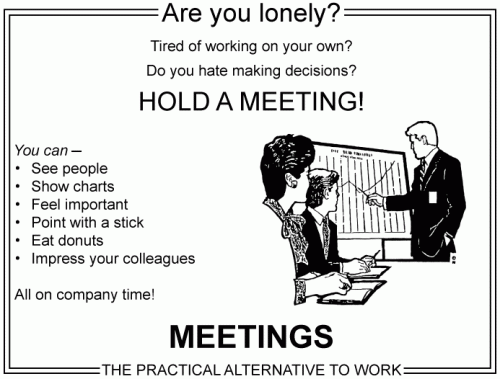Do you feel that there are too many meetings filling up your calendar?
Do you ever stop to ask yourself what is the purpose of all those meetings?

Image from My Confined Space, original artist unknown.
I have come to the conclusion that most meetings are a waste of time for a number of reasons:
- Meetings are very inefficient in communicating (pre-analysed) information
- Meetings give you a feeling that you have contributed, “done your bit”, with very little real effort or actual outcomes
- Meetings give you false sense of progress and a warm fuzzy feeling that “someone is looking after it” when in reality no ownership has been assigned
- Participants often lack authority or will to make decisions
- Meetings usually involve too many people
Meetings in and of themselves are not the culprit though. The real issue is that we tend to use the tools and techniques that we are most familiar with and because everyone knows how meetings work (do they really?) they have become the “lowest common denominator” and a de facto business tool, even with all the associated problems listed above.
How can we improve this? By selecting the proper tool for the job at hand:
Do you need to make (pre-analysed) information available to a larger group?
Publish it using an online collaboration tool or on an intranet where each team member can read, digest and comment on it at their own pace. Set a deadline for comments. Follow up.
Do you need to make a decision?
Ensure a small group with the authority to make decisions has all required information on hand (online, of course) and a clear deadline to make their decision by. Let them select their own communication medium, don’t just “call a meeting” by default. Make sure this group publishes their decision online for the wider team immediately once it’s made.
Do you need to ensure ownership?
Foster true teamwork (this is the hard part). Then use an online work management tool to assign work clearly. All work that takes longer than two hours should be captured into a task and assigned to a team member. If you can change your organisation to manage all its work this way, rest assured that vague references to “someone” will be dramatically reduced.
These are only a few examples, I am sure you can think of many more.
Please feel free to post your ideas below.
In closing
Whenever you get an urge to call a meeting stop and think about what you are trying to achieve. More often than not, you can substitute meetings with other, more productive tools and techniques.
Indeed, there is a legitimate purpose for a handful of people to gather together for work: teamwork. Just don’t call it a meeting!
More views on meetings
- 37signals: Meetings are toxic
- Greg Raiz, Raizlabs: How to meet – Fight Club style
- Seth Godin: Getting serious about your meeting problem
- Seth Godin: Three kinds of meetings
- Ricardo Semler: Maverick: The Success Story Behind the World’s Most Unusual Workplace (pp.296-297), discussed by Matt Linderman, 37signals: Tips on how to work smarter from Ricardo Semler
- Steve Sammartino, Start Up Blog: In order of preference